SDG4: QUALITY EDUCATION
Sustainable Development Goal 4 (SDG4) aims to ensure inclusive and equitable quality education and promote lifelong learning opportunities for all. In Saudi Arabia, significant efforts are being made to achieve this goal through national policies and initiatives. Majmaah University also plays an active role in supporting SDG4 through education programs, research, and community outreach.
KSA’s Efforts in Addressing SDG4 (Quality Education)
Vision 2030 and Education Reform:
As part of the Vision 2030 initiative, Saudi Arabia is prioritizing education reform to create a more competitive and knowledge-based economy. The goal is to enhance the quality of education, improve access to learning, and foster skills necessary for the future workforce. Key strategies include modernizing curricula, integrating digital technology into classrooms, and investing in teacher training programs.
Free and Accessible Education:
Saudi Arabia offers free education to all citizens from primary school through university, ensuring access to education for all social groups. This free education system is part of the government’s efforts to reduce inequality in learning opportunities and promote inclusive education across the country.
Education for All and Lifelong Learning:
The government promotes lifelong learning through a range of vocational training programs, adult education initiatives, and e-learning platforms. The Technical and Vocational Training Corporation (TVTC) offers a variety of skills training to equip individuals with the capabilities to succeed in the labor market. Additionally, the Tadreeb Initiative focuses on distance learning, ensuring flexible access to education.
Inclusivity in Education:
Special attention is given to marginalized groups, including women, rural populations, and individuals with disabilities. Through policies that ensure equal access to educational resources, Saudi Arabia is fostering a more inclusive environment. Women’s participation in education has surged, with female enrollment in universities now rivaling male enrollment.
Digital Transformation in Education:
The Ministry of Education has made significant strides in digitizing education, especially in response to the COVID-19 pandemic. Platforms like Madrasati and Rawdati have expanded the use of e-learning, ensuring that students across the Kingdom can continue their education remotely.
Majmaah University’s Role in SDG4 (Quality Education)
Majmaah University plays an essential role in supporting SDG4 through its educational programs and community outreach:
Equitable Access to Higher Education:
Majmaah University offers a wide range of undergraduate and graduate programs that are accessible to students from diverse backgrounds. By providing scholarships and financial aid, the university ensures that economically disadvantaged students have the opportunity to pursue higher education. This aligns with SDG4’s focus on inclusivity and equal access to learning.
Educational Quality and Curriculum Development:
The university constantly works on curriculum development to ensure that its programs meet international standards. It integrates modern teaching methodologies and offers programs designed to equip students with skills that are essential for today’s job market. Majmaah University also emphasizes research and innovation, encouraging students to engage in knowledge creation and scientific exploration.
Teacher Training and Professional Development:
Majmaah University supports SDG4 by offering teacher training programs aimed at improving the quality of education at all levels. These programs focus on developing the skills of educators, ensuring that they are prepared to meet the needs of a rapidly evolving educational landscape.
E-learning and Digital Education:
In response to the increasing demand for digital education, Majmaah University has expanded its online learning platforms. This enables students to access courses and materials remotely, thus promoting lifelong learning opportunities. By offering a blended learning approach, the university ensures that education is accessible to those who may not be able to attend in-person classes.
Community Engagement and Lifelong Learning:
Majmaah University is deeply involved in community education and outreach. It runs community programs that provide adult education, vocational training, and public lectures. These initiatives are aimed at fostering lifelong learning and equipping local communities with knowledge and skills that improve their quality of life.
Both the Saudi government and Majmaah University are committed to achieving SDG4 by improving education quality, accessibility, and inclusivity. Through Vision 2030, the Saudi government is transforming the educational landscape to meet future challenges, while Majmaah University is actively contributing by providing inclusive, equitable, and high-quality education opportunities, supporting teacher development, and promoting digital learning. Together, these efforts are helping Saudi Arabia move closer to achieving SDG4 and creating a knowledge-based society.
https://www.mu.edu.sa/sites/default/files/content/2020/10/General%20Student%20Handbook.pdf
The Deanship of Library Affairs at Majmaah University started to work on the development of the university libraries since the appointment of a supervisor to run its activities in the middle of the year 1431H. On 29thZliqad, 1431H, an approval was granted by H.E. the Minister of Higher Education and the Rector of the University Council to appoint a Dean for Library Affairs. Right from its outset, the Deanship of Library Affairs worked hard and prepared a strategic plan to achieve its mission and complete its various projects including a number of current and future projects of the Deanship. The Deanship and the Central Library are located at the new building of the University Headquarters - University City of Majmaah University.
Vision:
Upgrading the university libraries so as to make the minarets of knowledge, centers for providing all kinds of information, and sources of learning, searching and innovation in an encouraging and motivating atmosphere.
Mission:
Supporting learning and research needs of the university employees and students through providing information storages, academic curriculum, and offering a variety of services. It also seeks to provide suitable atmosphere for reading and utilizing these services, creating programs, different cultural activities, spreading of reading culture, and enhancing our attitude towards the books
Objectives
A. Providing information sources in all its different kinds required by libraries and units of the university
B. Providing technical treatment and organization of information sources within libraries affiliated to the university through using the best vocational methods which would contribute to make use of its sources accessible for beneficiaries
C. Ensuring continuous planning and offering information services in all the affiliated libraries in a way which would be suitable for the beneficiaries’ requirements
D. Planning for investing the allocated budget for information sources and services and development of its resources.
E. Establishing a digital library for the university and improving, optimizing its services on a continuous basis.
F. Extending cooperation with other libraries and authorities of mutual concern in a way to achieve benefits to the university and its different units.
G. Organizing fairs in the field of libraries and information and participation according to the pursued measures.
H. Promoting the scientific production of the university members using proper means.
I. Ensuring continuous planning and providing sufficient well qualified manpower in the field of libraries and information according to size and requirements of work and the offered services in the different libraries of university.
J. Preparing criteria, specifications and measures related to the university libraries and its services in a way which ensures the high quality of its services offered through such libraries.
Rules and Regulations
Deanship of Libraries Affairs has completed the regulations to be applied in branch libraries in faculties and centers. These regulations and rules are to be fixed and implemented in Deanship of Libraries Affairs. This set of regulations comprises forty-one articles in three chapters:
Lending System and Booking Information Objects (Article 16)
Following groups are allowed to borrow information objects to:
A. Teaching staff, lecturers, teaching assistants in university
B. Graduate students in university
C. Graduate students who are not employed by university
D. Undergraduate students in university
E. University male and female employees
F. Affiliated libraries within the university
G. Other universities in Saudi Arabia and Gulf countries according to the agreements signed inthis regard.
The borrower is not allowed to borrow any book unless they show an ID which proves they belong to university (Article 17). Following information Objects are not allowed to be borrowed (Article 18).
A. Information objects that have reference nature such as knowledge circles, dictionaries and guides
B. Unpublished PhD and Master's theses
C. Unique books
D. Paperless information objects (audio, visual, CDs, video books)
E. Scientific periodicals that are related to the topic
F. Government printed books, documents, maps and folders
G. Books that there is only one copy of. Teaching staff and teaching assistants are excluded as they could borrow them on weekends
H. Booked books
I. Books that are stamped (Not for Lending)
J. Books that have more than two volumes
Financial Guarantee (Article 19)
A. There is a borrowing card worth 1000 riyals issued for all graduate students who are not employed by the university. The card validity is one year and must be renewed yearly before one month of expiration date.
B. Money of financial guarantee is to be deposited in the account of Deanship of Libraries Affairs, and it will be refunded to the borrower in the event they want to cancel the borrowing card.
C. In case any borrower receives a fine, it will be deducted from the deposited financial guarantee by the borrower. If the fine is more than 1000 riyals, the user will be asked to pay the difference.
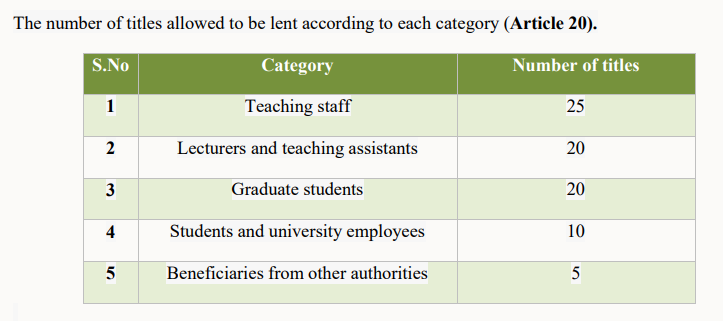
Borrowing period (Article 21)
A. Faculty members, lecturers and teaching assistants are allowed to keep the book for a complete academic semester; graduate students for sixty days. Faculty members are allowed to renew one time for one more semester.
B. University students and employees are allowed to renew one month for only one time.
C. Director of Beneficiaries services section in the central library and librarians in branch libraries are allowed to shorten the lending period to one month for the categories mentioned in clauses (A and B) for most borrowed information objects that there are not adequate copies of them in the libraries.
D. The borrower is allowed to renew the borrowing period in the event the books they have are not requested by another library user.
E. The borrower must return the books before the specific timing of return in case it was requested from him within a period of three days at the maximum from the date he was informed by Deanship.
Booking books (Article 22)
A. Faculty members are allowed to book some books for a fixed period of time for students use inside the library, but these books are not allowed to be lent for external people.
B. Lending section director has the right not to allow lending of any book in the event he sees it is necessary to keep it in the library.
C. Booked books should be organized as it is explained in clauses (A and B) according to the following:
a. Internal lending for every female and male student for two hours’ maximum. It is renewable in the event the book is not often borrowed.
b. Lending section director is allowed to lend some copies of the booked books before one hour of library close-time provided it will be returned the next day in the morning before 9 o'clock.
Sections of the Central Library
• Library Management
• Services beneficiaries
• The electronic catalog
• Hall of free viewing and reading
• Periodicals
• References and foreign books
Central Library Services
Access to Data It provides access to data provided by the Central Library and branch libraries through internal services by providing the right atmosphere, counseling and guidance services.
Printing and Imaging Service
Printing and imaging services are provided to the students for the educational process according to the rules laid down by the Deanship.
Guidance Service
The Deanship welcomes different groups of students under the supervision of some faculty members to visit the library. The students are briefed about the use of the library and the services provided by the Deanship of Library Affairs.
Reference Services
The Data provides answers to questions and queries of the beneficiaries and employees of the university through reference sources such as dictionaries, encyclopedias, manuals and reports in both printed and electronic forms.
Access to Daily Newspapers and Magazines
The Deanship provides a number of daily newspapers for consultation in the Library like: "AlRiyadh", ―Saudi Gazette‖, ―Almadina‖ (newspaper), etc
https://www.mu.edu.sa/ar/news/165751
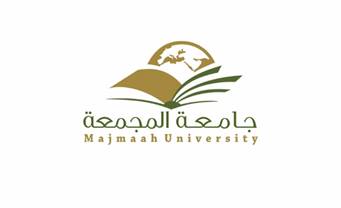
The Deanship of Library Affairs at Majmaah University launched the initiative (Your Time in Your Home) using the unified search portal (MuFind), which contributes to supporting and encouraging all research and scientific processes, and helps to enhance information awareness and knowledge enrichment, and provide knowledge sources for all researchers to access information sources by browsing more than 800 million electronic scientific materials distributed between electronic books, scientific articles, audio books, university theses and others, which in turn allows beneficiaries of university libraries and researchers It is worth noting that the unified search portal is the first of its kind among Saudi universities that allows the beneficiary to link the university's library index and digital information sources in one search portal without the need to move between different sources of information, and it is also characterized by many characteristics and features, namely: Access to the social index available on the Internet, user participation in the creation and enrichment of knowledge content, support for all types of research in information sources, and support the researcher with smart search tools.
Where access to the portal so far reached 20351,<> browsers. The portal can be accessed via the following link:
https://www.mu.edu.sa/sites/default/files/content/2020/10/General%20Student%20Handbook.pdf
Saudi Digital Library is the largest collection of e-books in the Arab world which currently contains more than 114 000 e-books with full-text on various disciplines of more than 300 publishers worldwide such as Elsevier, Springer, Pearson, Wiley, Taylor & Francis, Mcgrawhill, etc. It also contains books ofworld-class academic publishers like Oxford University and Harvard University. Services:
· Access to the full text of electronic books from anywhere and at any time.
· Availability of free search through keywords (Full text - Title - Author - Subject - date of publication).
· Giving a range of advanced interactive services.
· Providing electronic reference service.
· Providing awareness of information service.
· Providing uniform access to the digital library.
Search Service in the Electronic Databases
Deanship of library affairs offers through its gateway the Internet thirty-one (31) global electronic database covering all disciplines at the University and can be accessed through the portal at the following link: http://dla.mu.edu.sa/node/36
Automated Search Service in the Electronic Catalog
Central Library offers research services in the electronic catalog and provides training and guidance on the use of the electronic catalog to take advantage of it. Following is a link to the index on the Internet http://dla.mu.edu.sa/node/22
Search Service on the Internet
Central Library offers research services to the beneficiaries via internet in order to obtain information and sources that may not exist in the sources of information within the university libraries.
The International Conference shall be held: Universities and the Sustainable Development Goals 2030
https://event.mu.edu.sa/universities-conference
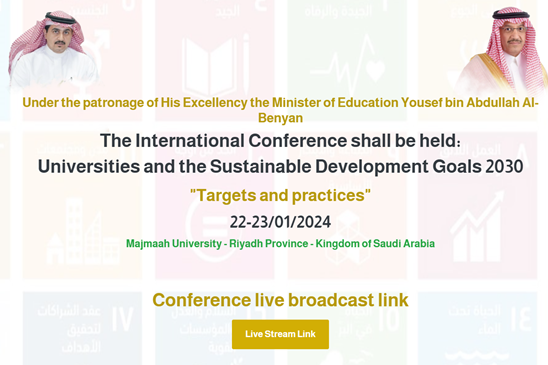
This conference represents a global call to unite the efforts and intellectual and academic minds and those interested in the Global Agenda for Sustainable Development 2030, who share a clear vision and a directed commitment aimed at promoting sustainable development worldwide, as the conference seeks to emphasize the importance of the responsibility entrusted to universities in achieving the Sustainable Development Goals 2030 (SDGs), in line with the successive development towards knowledge, understanding and practical application of these goals. This prominent event is a fertile forum for reflection and exchange of experiences, and contributes to expanding the horizon of knowledge, deepening understanding, and encouraging innovation and development in the fields of sustainability, as we aspire through it to launch the spirit of cooperation and dialogue between scientists, thinkers and innovators in order to achieve tangible and sustainable progress in this vital field, and we look forward - during its period - to a dialogue environment that contributes to creating an opportunity to review and discuss achievements, challenges and future opportunities related to the role of universities in achieving the sustainable development goals 2030.
Conference Venue:
Majmaah University is one of the public universities in the Kingdom of Saudi Arabia in the Riyadh region, and the university serves a geographical scope that includes the northern governorates of the Riyadh region. The university provides education at the undergraduate, postgraduate and applied studies levels, where more than 20,000 students study in the disciplines of medicine, allied medicine, dentistry, engineering, science, artificial intelligence, cybersecurity, law and business administration, arts and education, and universities also receive international students from different countries of the world, and there are specialized research centers and laboratories in health, engineering, science, and humanities, and there is a center specialized in rehabilitation techniques for the manufacture and installation of prostheses.
Main objectives of the conference
The core objectives of this conference are to enable in-depth dialogue on sustainable development and achieve its goals, and we seek to highlight the vital role played by universities in this context, with a focus on building strategic partnerships to promote sustainability initiatives and practices, and the conference also works to integrate the diversity of visions and solutions, to ensure a deeper and multidimensional understanding of sustainable development issues, by creating an environment to emphasize the role of universities in accelerating work to achieve the Sustainable Development Goals 2030. Through this intellectual, scientific and professional forum, we hope to contribute to the exchange of knowledge, promote innovative thinking, and build the optimal capabilities of universities and individuals to achieve the goals of sustainability 2030, and summarize the main objectives of the conference as follows:
- Seek to shed light on the key and multifaceted role of universities in achieving the Sustainable Development Goals, while reviewing their achievements and the challenges they have faced.
- Provide a platform for the exchange and discussion of innovative strategies and approaches to enhance the effectiveness of universities in achieving these goals.
- Create an appropriate environment that stimulates substantive discussions, mutual learning and enhance cooperation among participants.
- Focus on strengthening the capabilities and determination of universities and individuals in pursuit of sustainability.
- Emphasizing joint efforts and renewed cooperation that can contribute to achieving tangible progress in the field of sustainable development, ensuring a more just and sustainable future for all.
Conference Themes
The international conference "Universities and the Sustainable Development Goals 2030: Targets and Practices" revolves around four carefully selected themes, each designed to stimulate insightful discussions and meaningful contributions.
The first axis: development and sustainability: goals, concepts, and impacts.
It discusses the philosophy of development, sustainability and sustainable development, and concepts associated with the United Nations Sustainable Development Goals and aims to deepen our understanding of these critical concepts in a global context.
Second Theme: Sustainable Development Goals 2030 and the Kingdom's Vision 2030
It presents topics that discuss the relationship between the Kingdom's Vision 2030 and the Sustainable Development Goals 2030 by mentioning aspects of the link between the development goals and the vision, as well as the Kingdom's efforts in achieving the sustainable development goals.
Third Theme: The Role of Universities in Achieving the Sustainable Development Goals 2030: Current Reality
It describes the reality of the efforts made by universities through their functions to contribute to the achievement of the Sustainable Development Goals 2030, and the obstacles that universities face in order to play the role required of them in this field.
Fourth Theme: Activating the role of universities in accelerating the achievement of the Sustainable Development Goals 2030
This theme allows participants to present proposed strategies and visions to activate the role of universities in achieving and accelerating the achievement of sustainable development goals.
University Medical Center Holds First Aid Initiative in the Digital World
https://m.mu.edu.sa/ar/news/centers-and-institutes/university-medical-center/205356
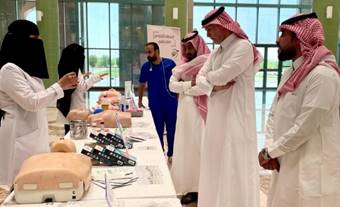
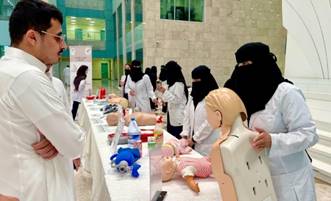
The University Medical Center held the First Aid in the Digital World initiative event in cooperation with the Community Service and Social Responsibility Observatory, which was held in the University Administration and Colleges Building on Sunday and Monday 10-11/9/2023 AD, where the medical team presented educational programs to visitors about first aid methods for emergency cases. As is known, a person may face difficult circumstances and situations that impose themselves suddenly and without warning, and when a person has the knowledge and awareness of how to act in such circumstances and situations, this may save a person’s life; that life that is priceless.
The primary goal of first aid is to prevent death or serious injury. The main goals of first aid can be summarized in three main points:
- Preserving life.
- Stopping harm or damage, such as removing the patient from the source of harm or the scene of the accident and applying pressure to wounds to stop bleeding.
- Promoting healing by providing initial treatment for the injury.
University Medical Center participates in seasonal influenza vaccine event
https://m.mu.edu.sa/ar/news/centers-and-institutes/university-medical-center/204856
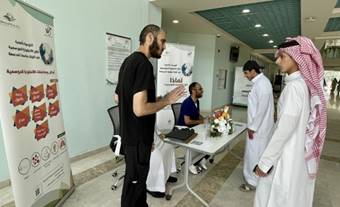
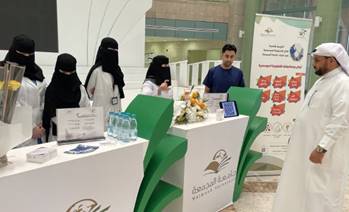
The University Medical Center participated in the awareness event on the importance of the seasonal influenza vaccine, which was held by the Volunteer Center at the Social Responsibility Observatory, as part of the initiatives it offers to care for society and health, and to enhance and activate social responsibility.
His Excellency the Advisor and Supervisor of Administrative, Financial and Technical Affairs, Professor Dr. Muslim bin Muhammad Al-Dosari, launched the event in the University Administration Building and the Supporting Deanships, which was held for three days in various buildings of the university administrations in Majmaah and Zulfi, where the work team presented medical brochures and educational materials on the importance of the vaccine and its benefits and developed a questionnaire for visitors about the event, from which more than 300 visitors benefited.
On this occasion, the supervisor of the Social Responsibility Observatory, Professor Faisal bin Faraj Al-Mutairi, stated to the university’s media center that these campaigns come within the framework of the directives of His Excellency the University President, Professor Saleh bin Abdullah Al-Muzal, and with the follow-up of His Excellency Professor Musallam Al-Dosari, and in line with the university’s orientations in opening up to society with all its components based on its social responsibility, and contributing to achieving the targets related to the health field, in partnership with the relevant parties, stressing that the university is proceeding with its plan related to its social responsibility, and what this requires in terms of working with partners to address various societal issues according to its priorities, extending his thanks to His Excellency the University President, the partners, and the Social Responsibility Observatory team that implemented this campaign.
https://www.mu.edu.sa/ar/news/general/216985
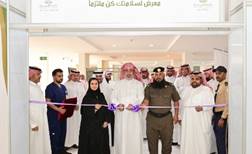
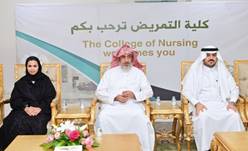
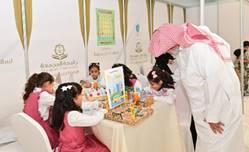
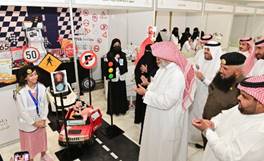
Based on the university's keenness to enhance its continuous role in achieving traffic awareness, the university launched a traffic safety exhibition (For your safety, be committed), which aims to spread traffic awareness and achieve one of the goals of the Quality of Life Program and the Kingdom's vision to reduce the rate of accidents. A number of government agencies, community sectors, and public education schools participated in the exhibition, which was held by the Salik Center for Traffic Safety in cooperation with the College of Nursing. His Excellency the Vice President for Development and Investment, Professor Dr. Muslim bin Muhammad Al-Dosari, inaugurated the exhibition in the presence of a number of deans of colleges and directors of departments at the university. His Excellency and the accompanying delegation toured the exhibition, which included the participation of more than 15 entities, and male and female students of the university and general education participated in it. In the presence of the Vice President for Development and Investment, the objectives of the Charter for Enhancing the Importance of Traffic Safety were transferred from the Applied College (represented by the CEO of the College, Dr. Shadi Al-Shuwaier) to the College of Nursing (represented by the Dean of the College, Dr. Ashwaq Asiri), as this charter is considered an initiative by the university to enhance the importance of traffic safety.
It is worth noting that the branch of the Applied College in Ramah was able to achieve the objectives of this charter during the previous year, and the College of Nursing will activate the objectives of the charter at the beginning of the academic year to reach an advanced level of traffic awareness programs directed at the college students and members of the community.
For his part, the Director General of the General Administration of Services, Mr. Mutab Al-Maimouni, expressed his thanks and appreciation to His Excellency the President of the University, Professor Dr. Saleh bin Abdullah Al-Mazal, for his continuous support for traffic safety programs, and to His Excellency the Vice President for Development and Investment for his sponsorship of the “For Your Safety, Be Committed” exhibition, hoping that all efforts will be combined to achieve a high rate of reducing accidents through continuous awareness.
The university holds the annual meeting for new students for the academic year 1446 AH
https://www.mu.edu.sa/ar/news/general/216956
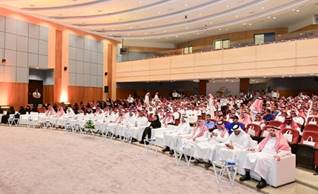
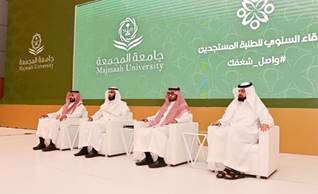
The university, represented by the Deanship of Student Affairs, held the annual student meeting for the academic year 1446 AH, under the patronage of the Vice-Rector for Educational Affairs, Prof. Dr. Muhammad bin Saleh Al-Aboudi, and in the presence of the Vice-Rector for Graduate Studies and Scientific Research, Prof. Dr. Muhammad bin Abdulrahman Al-Shahri, and the deans of colleges and supporting deanships, at the University City Theater in Majmaah.
The meeting began with a speech by the Vice President for Educational Affairs, who began by thanking God Almighty, then thanked the Custodian of the Two Holy Mosques, King Salman bin Abdulaziz, and his Crown Prince - may God protect them - for the tremendous capabilities they have provided in all fields, especially the great support that education finds, the fruits of which are reaped by Al-Majmaah University. Then His Excellency presented a number of parental guidelines for male and female students, in which he emphasized adherence to values and morals, and choosing good company. He also emphasized the importance of academic achievement, and His Excellency stated that the student has rights and duties, stressing that all university officials have open doors to male and female students.
After that, the Dean of Student Affairs, Dr. Badr bin Mutab Al-Salmi, participated with a speech in which he began by extending his sincere thanks to our wise government for their interest and great care for the Ministry of Education. He also explained that the Deanship is proceeding in accordance with the university’s vision, goals, and aspirations, and enjoys in particular the sound guidance and continuous follow-up from the university president. He presented a visual presentation to introduce the Deanship and the Deanship’s plan for the academic year 1446 AH.
After that, His Excellency the Dean of Admissions and Registration, Dr. Nasser bin Othman Al-Othman, delivered a speech in which he introduced the Deanship and the Charter of Rights and Duties of the University Student, and a brief about the study plans and academic movements. After that, the Deputy Dean of Admissions and Registration, Dr. Saleh bin Musleh Al-Harthi, presented a visual presentation about the university life journey, in which he touched on course registration, deletion, addition, absence rates, and the graduation document. After that, the supervisor of the Irtiqaa platform, Dr. Faisal bin Hakim Al-Shammari, presented an introduction to the Irtiqaa platform and ways to benefit from its services for university students. After that, His Excellency the Vice President for Educational Affairs received a number of interventions and inquiries from new male and female students.
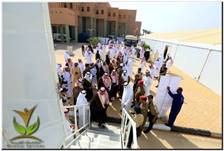
The Medical Services Caravan participated in the activities of the Gulf Universities and Social Responsibility Forum, which was held by the university, where we were honored by the presence of His Highness the Governor of Majmaah, Prince Abdulrahman bin Abdullah bin Faisal, His Excellency Dr. Majid bin Abdullah Al-Qasabi, Minister of Social Affairs, His Highness Sheikh Dr. Abdulaziz bin Abdulrahman Al Thani, Chairman of the Board of Trustees of the Humanitarian Funds of the Organization of Islamic Cooperation, His Excellency the University Director Dr. Khalid bin Saad Al-Muqrin, and a number of Their Excellencies the Directors of Gulf and Saudi universities, and a number of directors of entities related to social service.
The Dean of the College of Medicine and Supervisor of Medical Services, Dr. Khaled Al-Abdulwahab, gave a brief overview of the caravan, its content, and what it offers to serve the community.
The caravan received the attendees and visitors of the forum for 3 days and presented gifts in the form of educational brochures and first aid bags.
https://m.mu.edu.sa/ar/news/administrations/department-of-medical-services/195076
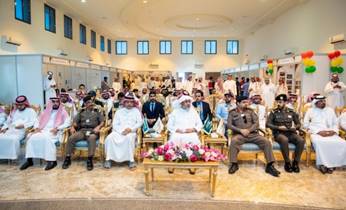
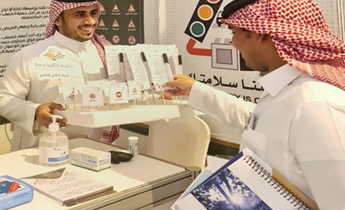
The University Medical Center participated in a booth at the awareness exhibition held at the Applied College in Ramah Governorate under the slogan (Together to Reduce Traffic Accidents), with the participation of a number of security, health and educational sectors in the governorate. The University Vice President, Prof. Dr. Muslim bin Mohammed Al-Dosari, inaugurated the exhibition implemented by the Salik Center for Traffic Safety as one of the programs and activities organized by the center, which aims to spread traffic awareness and culture among university members and the surrounding community. The medical center provided educational and health information to students and visitors, and methods of first aid for those injured in accidents when stopping them. It also provided its health services, including measuring blood pressure, sugar and weight, to visitors. We hope that the impact of this exhibition will be reflected in achieving the Kingdom's vision and the Quality of Life Program with regard to reducing the rate of traffic accidents.
https://www.mu.edu.sa/ar/news/general/216181
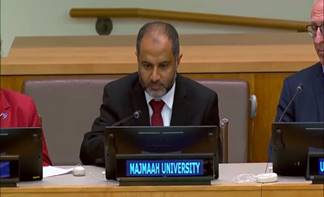
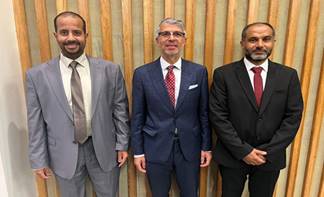
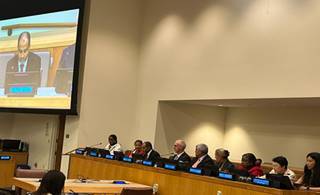
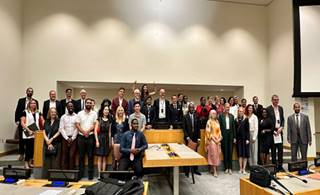
Majmaah University participates in the Higher Education for Sustainability Forum within the High-Level Political ForumMajmaah University participates in the Higher Education for Sustainability Forum within the High-Level Political Forum
Under the follow-up and guidance of His Excellency the President of the University - Chairman of the Board of Directors of the Saudi Ceval Center, Prof. Saleh bin Abdullah Al-Muzal - the University participated in the Higher Education for Sustainability Forum (HESI) for the year 2024, which was held as a special event within the High-Level Political Forum (HLPF) to follow up and review the 2030 Agenda for Sustainable Development.
The event was attended by His Excellency the Permanent Representative of the Kingdom to the United Nations, Ambassador Dr. Abdulaziz Al-Wasil, and high-level representatives from international organizations and governments. The university was represented as a speaker by the Vice-Rector for Graduate Studies and Scientific Research, Professor Dr. Muhammad bin Abdulrahman Al-Shahri.
The event focused on “The Future of Higher Education for Sustainable Development,” and the forum included multi-stakeholder discussions on the intersection of education, innovation, and sustainability, with a focus on the impact of AI and other emerging technologies amid challenges related to stalled progress towards achieving the Sustainable Development Goals (SDGs).
The event highlighted inspiring initiatives from the UN system, HESI working groups and others, and the forum served as a preparatory platform for future initiatives to be promoted or launched at the Future Summit 2024, where recommendations and strategies from the forum will shape policies and practices, influencing action plans for sustainable development in higher education.
During the forum, the importance of transforming higher education institutions to keep pace with dynamic global changes and an unpredictable future was recognized, while valuing local knowledge and partnerships, exploiting global opportunities for innovation, and promoting sustainable and equitable development around the world. Areas were identified in which higher education institutions can enhance the achievement of the Sustainable Development Goals through inclusive emerging technologies, including artificial intelligence, while managing related social changes. The membership network was also expanded through the active participation of diverse HESI working groups.
For his part, Professor Dr. Muhammad bin Abdulrahman Al-Shahri stressed the support and guidance of His Excellency the University President - and Chairman of the Board of Directors of the Saudi Ceval Center - in enhancing the role of the university in such global events, which enhances the university’s position and contributes to achieving sustainable development goals at the local and international levels.
College students win first place in the third health innovation hackathon
https://www.mu.edu.sa/ar/news/colleges/college-of-applied-medical-sciences/199561
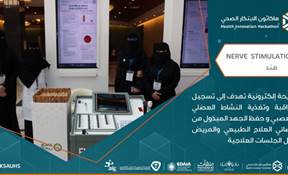
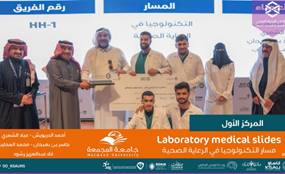
The college students won first place in the third Health Innovation Hackathon, which was held under the patronage of His Excellency the President of King Saud bin Abdulaziz University for Health Sciences, Professor Dr. Bandar bin Abdul Mohsen Al-Qanawi, in its third edition, which was held from January 27-31, 2023 in Riyadh, Jeddah, and Al-Ahsa, and under the supervision of the Intellectual Awareness Unit at the Deanship of Student Affairs, and in partnership with the Saudi Data and Artificial Intelligence Authority (SDAIA), the Saudi Intellectual Property Authority, the Saudi Authority for Small and Medium Enterprises (Monshaat), and Elm Company. The participation was by a team from the Laboratories Department in the innovation exhibition with the developed version of the tissue drying and fixation device on laboratory medical slides. The college congratulates the winning students: Ahmed Al-Dariwish, Ayad Al-Shammari, Jasser bin Baaijan, Muhammad Al-Muharib, and the project supervisor, Prof. Dr. Raed Al-Baradei.
The college also thanks the participating team of female students from the Department of Physical Therapy for their active participation, which was entitled: A slide to stimulate and monitor muscular and nervous effort during physical therapy sessions. They are: Hind Al-Mutairi, Rand Al-Khamis, Noura Al-Qashami, and Aseel Al-Mutairi.
Policy Statement on Students' Rights and Responsibilities
https://www.mu.edu.sa/sites/default/files/content/2020/10/General%20Student%20Handbook.pdf
At Majmaah University, life outside the classroom is an integral part of the educational process. The exercise of responsibility is an important part of the development of the full potential of the student as an individual and as a citizen. The student’s awareness of the extent of his or her rights and responsibilities is necessary to the exercise of responsibility within the University community. To further these objectives and in recognition of students as members of the Majmaah University community, the University has adopted the following statement of policy.
a. Majmaah University does not discriminate or permit discrimination by any member of its community against any individual on the basis of race, color, religion, national origin, gender identity, parental status, marital status, age, disability, citizenship, or genetic information in matters of admissions, employment, services or in the educational programs or other activities.
b. The student has freedom of research, of legitimate classroom discussion, and of the advocacy of alternative opinions to those presented in the classroom.
c. The student will be evaluated on the basis of knowledge and academic performance for purposes of granting academic credit and not on the basis of personal beliefs.
d. The teacher-student relationship within the classroom is confidential, and disclosures of a student’s personal or political beliefs expressed in connection with course work will not be made public without explicit permission of the student. It is understood that the teacher may undertake the usual evaluation of knowledge and academic performance.
e. Students’ records may be released to persons outside the University only on request of the student or through compliance with applicable laws.
f. Students will be secure against invasion of privacy and unreasonable search and seizure.
g. to engage in all campus activities, exercising the right of a citizen of the community, state, and nation, provided he or she does not in any way purport to represent the University.
h. Students will have their views and welfare considered in the formation of University policy and will be consulted by or represented on University committees that affect students as members of the University community.
i. It is recognized that every member of the community has the responsibility to conduct themselves in a manner that does not violate the rights and freedoms of others and has the responsibility to recognize the principles within this statement of policy.
Rights and Responsibilities of Students and Authority
https://www.mu.edu.sa/sites/default/files/content/2020/10/General%20Student%20Handbook.pdf
At Majmaah University, we must vigorously pursue an academic, work, and social environment that is civil, fair, and founded upon mutual respect and trust. All individuals within the broad University community should share this aspiration and its attendant responsibilities.
As members of the Majmaah University community, its faculty, staff, and students are expected to deal with each other with respect and consideration. The University also expects students to follow kingdom laws. Within this framework, students have guaranteed rights, but the exercise of those rights may not interfere with the rights of others in the University community.
Student Rights:
a. The right to pursue academic and other goals without being subject to discrimination on the basis of race, color, religion, national origin, sex, parental status, marital status, age, disability, or citizenship
b. Protection against unlawful searches and seizures
c. Freedom to exercise the civil rights to which any citizen of the Kingdom of Saudi Arabia is entitled
d. The right to a fair and impartial hearing, either through administrative procedures or through the University Hearing and Appeals System, regarding allegations of violations of institutional rules.
In the exercise of these rights, students may file reports of incidents with the University administration with the expectation that such reports will be investigated in a timely and thorough manner.
Student Academic Ethics Policy
https://www.mu.edu.sa/sites/default/files/content/2020/10/General%20Student%20Handbook.pdf
The culture of the Majmaah University is characterized by a long-standing commitment to student learning and to excellence in teaching. This commitment has been established through the development of an open, ethical and caring community that promotes diversity, honesty, integrity, respect, fairness, trust and civility among its members. This community has created a culture based on core values that include intellectual vitality, intellectual and academic freedom, the well-being of its members and service to others.
In order to realize its commitments and values, all members of the university community must demonstrate academic integrity and ethical behavior and foster academic integrity and ethical behavior in others. Those who violate university’s standards of academic ethics must be held responsible for their misconduct. Those who observe violations of academic ethics have a responsibility to address it.
It is the purpose of this document to describe the responsibilities, provide definitions and examples of conduct which violates academic ethics and recommend appropriate sanctions in the case of misconduct.



